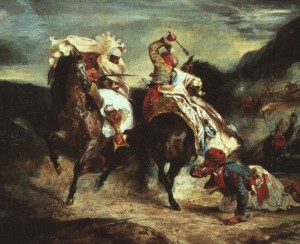 Inspired by the wild die mechanic of the D6 system, and Fantasy Flight’s narrative dice, GMs and players can incorporate their own narrative dice into d20 games, granting GM and player actions with blessings and curses. Here’s how:
Inspired by the wild die mechanic of the D6 system, and Fantasy Flight’s narrative dice, GMs and players can incorporate their own narrative dice into d20 games, granting GM and player actions with blessings and curses. Here’s how:
- Designate 1d6 as your blessing die and another 1d6 as your curse die. These dice should be different in color for easy distinction.
- Designate the even numbers on both dice for blessings and curses. Odd numbers are ignored. Blessings and curses correspond with the number rolled: the blessing die grants a +2, +4, or +6 on a rolled 2, 4, or 6. The curse die grants a -2, -4, or-6 on a rolled 2, 4, or 6.
- Blessing and curses cancel one another according to their value. For example, if a 6 is rolled on the blessing die (+6), and a 4 on the curse die (-4), then a +2 bonus is granted.
- GMs and players narrate their actions before rolling their blessing and curse dice along with their d20. For example, Mark wishes to strike a goblin, and he says, “I spin with a flourish before thrusting my longsword at the goblin’s head.” Then Mark rolls his d20 and blessing and curse dice together.
- Regardless of Mark’s success or failure, his blessing and curse dice count only for narrative purposes, not to be added to the d20 roll. For example, Mark’s d20 roll is successful and he hits the goblin, plus he rolls a 6 on his blessing die (+6) and 4 on his curse die (-4). Mark’s hit counts as normal, but he gains a +2 bonus applied to his next roll. Narratively, what accounts for the +2? That is Mark’s decision, based upon his previous description. Perhaps Mark says his spinning flourish dazes the goblin for a moment, giving him an advantage to strike the goblin next round.
- Blessings and curses can be bestowed upon others. For example, Mark’s +2 could be bestowed upon a fellow player who hasn’t yet acted.
- Blessings and curses can be bestowed upon the opposition. For example, Mark’s +2 could bestow a curse (-2) on the goblin’s next roll.
- GMs and players narrate their own blessings. GMs narrate player curses. Players narrate GM curses.
- Critical hits double blessings. Fumbles double curses. Critical hits do not impact curses. Fumbles do not impact blessings. For example, if Mark rolls a 20 with a 4 on his blessing die (+4), he’s granted a +8. Or if Mark rolls a 1 with a 4 on his blessing die (+4), he’s granted the usual +4.
- Blessings and curses are applied to all d20 resolution tasks, not just combat. Be creative. Blessings and curses can impact virtually any existing modifiers (AC, skill checks, spell resistance, feats, damage reduction, and so on). Encourage players to really narrate their actions and reactions based on the outcome of the blessing and curse dice.

Great article! I love the exploding dice in Deadlands and the advantage/threat mechanic in Edge of the Empire. This is a nice way to bring that feel to Pathfinder.
I was just reading the Chaos/Wonder magic entry in Deep Magic, this complements that well.